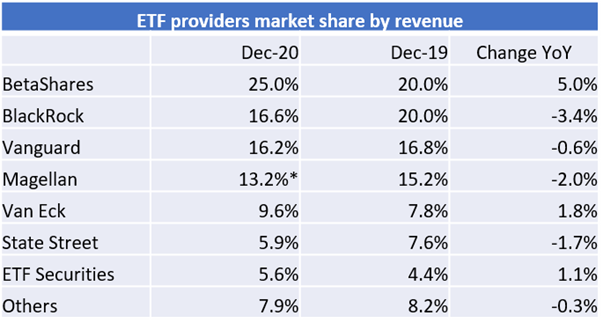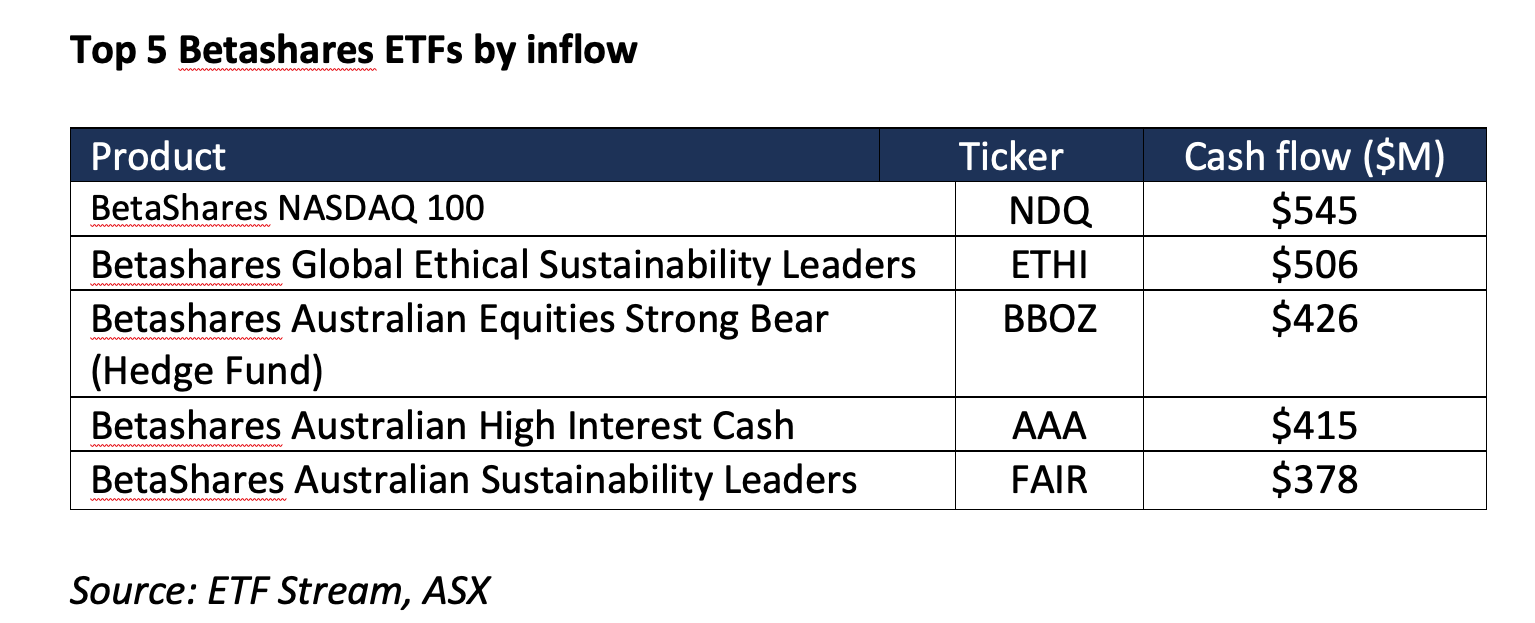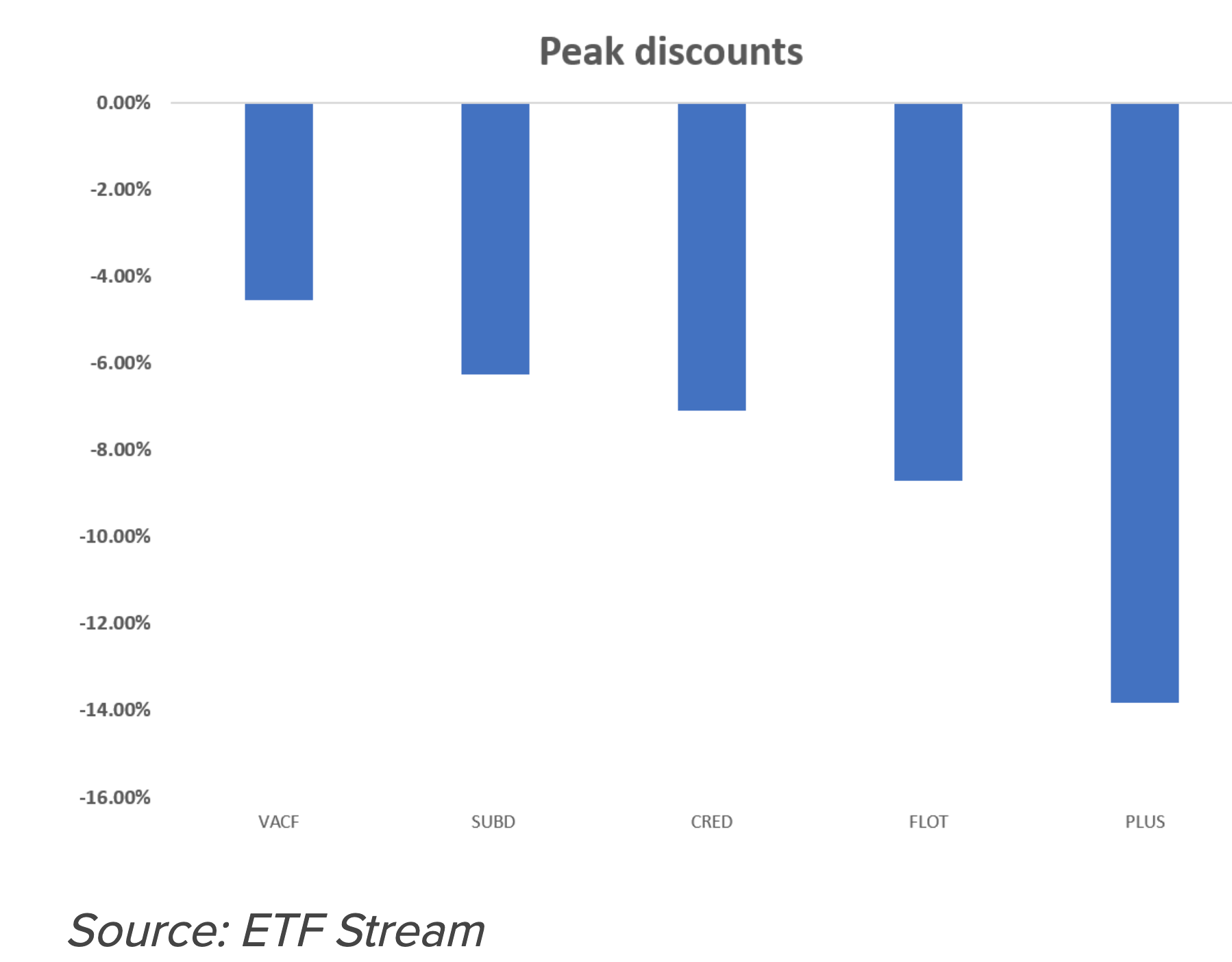7 top themes in ETFs after another record year
Exchange-traded funds defied dire expectations in 2020, despite the lightning March sell-off that saw global indices plummet. But the rebound was almost as sudden, and several index trackers delivered record inflows for the calendar year.
Though inflows aren’t the whole story, they provide interesting insights into sentiment.
Here we take a look across some of Australia’s most reputable ETF providers, comparing and contrasting their inflows over the year. We also ask them to name their five standouts, and what the immediate future holds for index investing.
On the other side of the ledger, we discuss the laggards.
What went wrong in the fixed income segment, where some ETFs hit liquidity problems as investors panicked? Is this a red flag for investors?

Source: ETF Stream using ASX data
The Robinhood effect
The so-called “Robinhood” set of clued-up, younger investors with big risk appetites and an eye for online bargains is called out by David Tuckwell, editor of industry title ETF Stream. “They’re fully educated about index funds, and because they’re younger, they’ve got a higher level of risk tolerance,” he says. This slew of younger ETF investors has also played a part in the segment sustaining and further boosting momentum during 2020.
“Before last year, it was unusual to see 20- to 30-year-olds enter the market en masse. For them, the selloff was “it’s like Black Friday on the share market,” Tuckwell says. Betashares’ profited from this demographic, as shown in the dominant technology theme among some of its biggest growers during the year.
And it’s not just Betashares. Listed product issuer ETF Securities Australia also capitalised, its Battery Tech and Lithium ETF (ASX: ACDC) pulling in around $47 million during the year.
But the overall winner in terms of ETF flows in 2020 was Betashares. The prolific locally-based ETF provider attracted around $5.4 billion of investor money last year, just less than index juggernaut Vanguard’s $5.7 billion. But in terms of total market share, it tops the chart, with 25% of total industry revenue versus 20% a year earlier.

“Betashares’ product strategy is very much ‘let’s catch as much rainwater as possible by putting out as many buckets as we can,’” says Tuckwell.
With around 65 ETFs, Betashares' line-up continues to grow, another handful of products due to launch in the next few weeks. “Part of it is because they’ve got the largest number of products. But it’s not that Vanguard and iShares couldn’t have more listed products; they just don’t want to,” Tuckwell says.
“ETF mistrust is cured”
Betashares co-founder Ilan Israelstam says the ETF product set last year performed exactly as it should.
“People could sell out whenever they wanted. Crucially, there isn’t a cure for the virus just yet, but I think any reluctance to trust ETFs as a structure has been cured,” he says.
“It was a perfect real-life test of how the investment structure of an ETF will perform in very volatile environments."
Betashares' technology and equity exposures fund, the NASDAQ100 ETF (ASX: NDQ) led the way, as shown in the above table.
The second-placed ESG fund, Global Ethical Sustainability Leaders (ASX: ETHI) is also notable. “This is the first time we’ve seen an ethical exposure even in the top 10 in terms of flows, which shows where the market is heading,” says Israelstam.
"Weapon of choice"
ETF Securities puts it perhaps most succintly.
"A large number of stuck-at-home investors bought the dip in March," says ETF Securities head of distribution, Kanish Chugh.
ETF Securities inflows for 2020

Source: ETF Securities
"Many used ETFs as their weapon of choice, as they provide a more diversified approach than picking individual stocks."
The only underperformer in terms of flows within ETF Securities' stable was the ETFS Ultra Short Nasdaq 100 Hedge Fund (ASX: SNAS), a hedge fund that rises in value when the tech sector falls. "With technology giants like Facebook, Amazon, Nvidia and Google posting strong results in 2020, investors who bet against the sector got burnt," says Chugh.
Turning to Vanguard, head of ETF capital markets Minh Tieu also notes the resilience of the space during 2020, at a time when markets were most volatile and the security of individual stocks declined.

Source: Vanguard
ETF Stream's Tuckwell also notes that VanEck – the subsidiary of Wall St powerbroker Jan VanEck had a good year that saw AUM continue to rise, led by VanEck Vectors MSCI World ex Australia Quality (ASX: QUAL) and Australian Equal Weight ETF (ASX: MVW). But he emphasises its strategy is to build products for people who spend more money on ETFs, such as financial advisers, and with bigger-ticket clients in mind, while some of the others in the local market are more targeted at smaller-balance retail clients.
The flight to quality by investors panicked about market volatility was a defining feature of 2020, explains Arian Neiron, managing director and head of Asia Pacific, VanEck. This led to the above-mentioned ranking within its top-five attractors of investor money last year, as shown here (from highest to lowest inflows):
- VanEck Gold Miners ETF (ASX: GDF)
- VanEck Vectors Australian Property ETF (ASX: MVA)
- VanEck Vectors MSCI World Ex-Australia Quality (Hedged) ETF (ASX: QHAL)
- VanEck Vectors Australian Equal Weight ETF (ASX: MVW)
- VanEck Vectors MSCI World Ex-Australia Quality ETF (ASX: QUAL)
“We also saw investors also turned to Australian equity ETPs to build their portfolios given more attractive valuations, especially compared to US shares,” Neiron says. This is underpinned by the popularity of VanEck’s popular Australian Equal Weight ETF, given its broad local exposure locally, without leaning too heavily on banks or miners.
Neiron didn’t name any laggards, “as they all saw reasonable inflows”.
Not all ETFs passed the test
But it certainly wasn’t all gravy for ETFs in 2020, and not all passives passed the coronavirus volatility test, says Tuckwell.
“ETFs overall did really well, but the mask came off some of the illiquid bond ETFs,” says Tuckwell, pointing out that discounts on some of the more illiquid bond ETFs moved into double digits.
When ETFs hold illiquid bonds, the bonds they own don’t magically become more liquid just because they’re inside an ETF.
“ETFs are not a Harry Potter product. Instead, the illiquidity of the bonds manifests itself as a discount on the ETF,” says Tuckwell.

Vanguard’s Tieu concedes that “selling pressure” from investors outpaced buying activity in mid-March.
“Facing a sudden lack of willing buyers, dealers became concerned that they would not be able to quickly move assets off their books, and this contributed to wider spreads for those assets,” he says.
“This in turn affected the bid-ask spread of ETF baskets and transaction costs across the ETF ecosystem.”
But he believes it stayed resilient during the peak of market volatility, with ETF market maker consistently able to commit capital and provide liquidity, albeit at a higher cost, enabling redemptions to proceed unimpeded.
Indeed, Tieu suggests ETFs played a price discovery function for fixed income and other less liquid markets and acted as shock absorbers, dampening some of the volatility less liquid markets.
“For example, many fixed-income ETFs are more liquid than the underlying fixed income securities in which they invest,” says Tieu.
“Although bid-ask spreads for ETFs generally widened—just like spreads for other securities—these products, and the markets in which they trade, generally performed as designed.”
Gold ETFs may offset credit risk
Fears over currency debasement underpins the rush to real assets like Gold and also to fixed income, including within the listed product space, says ETF Securities' Chugh.
Chugh suggests Gold ETFs may be a safer safe-haven play: "They have an advantage of not trading on discounts, in the manner that some fixed income ETFs did."
The biggest loser?
Tuckwell singles out State Street’s SPDR S&P/ASX 200 ESG Fund (ASX: E200) as the biggest ETF laggard of 2020.
“This fund, which claims to invest ethically, holds shares in Rio Tinto, despite destroying sacred aboriginal sites,” says Tuckwell.
“It holds shares in Westpac, despite violating anti-money laundering, child exploitation and counter-terror finance laws. And it holds shares in Whitehaven Coal, the big fossil fuel producer.”
He notes the fund has attracted just $20 million in investment, despite its “tiny” 0.13% fee.
Profit-taking took a toll
“In terms of outflows, there was only one : the US dollar ETF (ASX: USD),” says Israelstam.
“People were trading it and taking profits when the US dollar was running quite strong during the crisis. People were using it to express a view on the US dollar.”
What’s on the horizon?
Technology: Israelstam expects the growth in technology themes to continue. This will be driven, he says, by the work-from-home evolution and growing awareness of the crucial role of technology in our lives, “which should add to investors’ conviction.”
He thinks thematic investing via ETFs overall will continue to grow in popularity, for example in cybersecurity, cloud computing and robotics and artificial intelligence.
ETF Securities' Chugh also holds this view on tech ETFs. "We think that trends ushered in under the coronavirus – especially around technology – will be locked in and potentially accelerate."
Robotics and automation will be increasingly implemented by companies to boost productivity and cut costs - even as the virus subsides, he says.
"And internet usage in households will continue increasing, as more and better entertainment options become available online.
Biotechnology: ETF Securities Chugh also calls out the step-change we've seen in medical treatment during COVID.
"Doctors and medical researchers will continue turning to biotechnology, whose miracles have become more visible thanks to the global vaccine drive."
Younger skew in ETF investors: As emphasised a couple of times above, this is feeding not only the tech theme, but also ESG. “While there is the obvious political catalyst for this via the Biden Presidency, we believe this growth is part of a broader movement by investors towards investing in a way that aligns with their values,” says Israelstam.
“As investors in the ETF industry get younger and younger, this trend is expected to accelerate further.”
Values-based investing: Vanguard’s Tieu also expect interest in ethical investing will continue to grow, as more investors begin expressing personal values through their investments. And broadly speaking, he expects the Australian ETF market will push even higher this year and will top $100 billion.
Video gaming: Like the others, Neiron also tips the younger skew among ETF investors to continue, fuelled by social media communities and investment apps like Robinhood, which have opened up investing in all-new ways. Themes such as global video-gaming will also be driven by this shift.
“We will also see greater use by financial advisers and institutions as awareness of ETFs grows and the advantages they offer against a more heavily regulated industry where performance, cost and transparency are under greater scrutiny than ever,” says Neiron.
Smart Beta: And he expects “Smart Beta,” a core area of focus for VanEck, to continue growing this year. Flows to this segment hit a record $3.4 billion in 2020, comprising around 16% of total ETP inflows. “We’d expect similarly high growth in 2021,” Neiron says.
AUD vs USD: Currency-themed ETFs should also prove popular if the dollar continues its march toward US80 cents. “Some investors might want to hedge their offshore investments to avoid losing gains on international investments,” Neiron says.
Meanwhile, ETF Stream’s Tuckwell believes Vanguard is right to be optimistic. He expects the previous dominance of industry heavyweights Vanguard and iShares to return.
But the outlier of young investors buying the steep dip we saw in March “isn’t going to happen again,” says Tuckwell.
“I think this year will be a bit of a reset, where Blackrock and Vanguard do most of the heavy hitting.”
In terms of themes, he says some will work, such as those linked to global warming and climate change. “I think battery tech, solar power, renewables will continue to do well, just because if it doesn’t, we’re screwed," Tuckwell says.
“But the rest? It could go either way.”
Not already a Livewire member?
Sign up today to get free access to investment ideas and strategies from Australia’s leading investors.
1 topic
5 stocks mentioned
2 contributors mentioned

